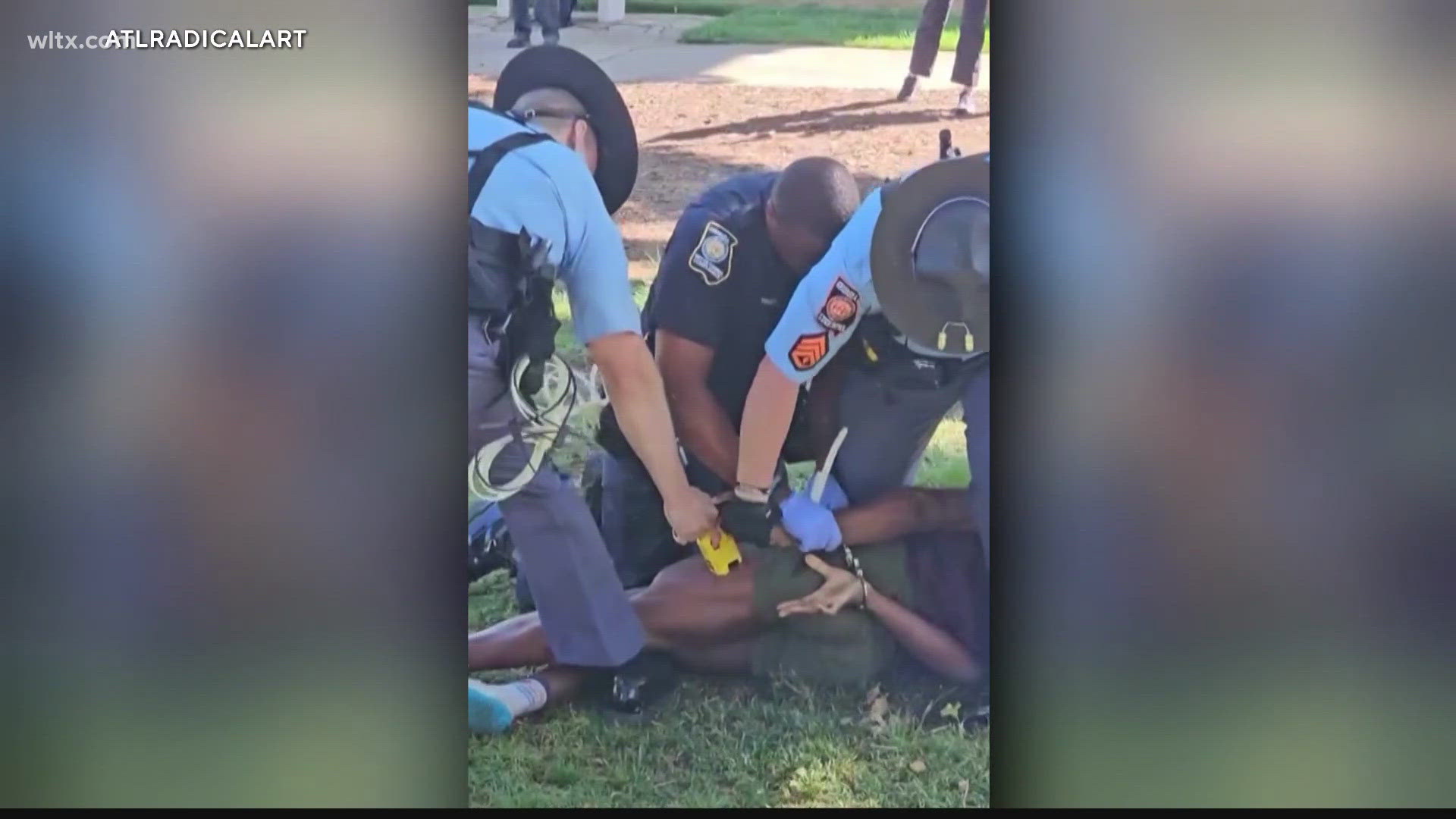NEW YORK — Chaos erupted overnight as police tried to break up a pro-Palestinian encampment at Emerson College in Boston, the latest flashpoint in a growing movement on college campuses around the country protesting Israel's war against Hamas in Gaza. Hundreds of people have been arrested in Massachusetts, Texas and California during the tense protests, following several rounds of arrests in New York in recent days.
At Emerson, 108 people were arrested and four police officers suffered injuries that were not life-threatening at the encampment, Boston police said Thursday. Those arrested were expected to appear in Boston Municipal Court.

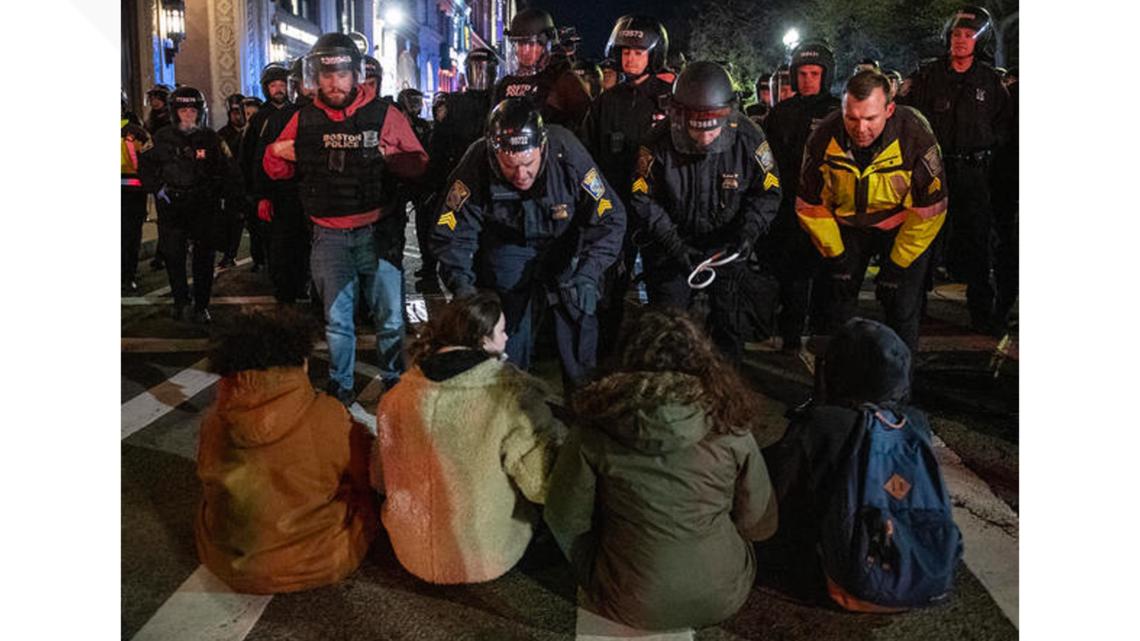
In nearby Cambridge, Harvard University had sought to stay ahead of protests this week by limiting access to Harvard Yard and requiring permission for tents and tables. That didn't stop protesters from setting up a camp with 14 tents Wednesday following a rally against the university's suspension of the Harvard Undergraduate Palestine Solidarity Committee.
Students protesting the Israel-Hamas war are demanding schools cut financial ties to Israel and divest from companies enabling its monthslong conflict. Some Jewish students say the protests have veered into antisemitism and made them afraid to set foot on campus as graduation nears, partly prompting a heavier hand from universities.
Harvard law student Tala Alfoqaha, who is Palestinian, said she and other protesters want more transparency from the university.
"My hope is that the Harvard administration listens to what its students have been asking for all year, which is divestment, disclosure and dropping any sort of charges against students," she said.
USC protests
Another 93 people were arrested Wednesday night during a protest at the University of Southern California and accused of trespassing, the Los Angeles Police Department said. There were no reports of injuries.
Tensions were already high at USC after the university canceled a planned commencement speech by the school's pro-Palestinian valedictorian, citing safety concerns. After scuffles with police early Wednesday, a few dozen demonstrators standing in a circle with locked arms were detained one by one without incident later in the evening.
Officers encircled the dwindling group sitting in defiance of an earlier warning to disperse or be arrested. Beyond the police line, hundreds of onlookers watched as helicopters buzzed overhead. The school closed the campus.
"Both sides of my family were displaced from Palestine, and I'm here using my voice because my grandparents couldn't," protester Randa Sweiss told CBS Los Angeles.

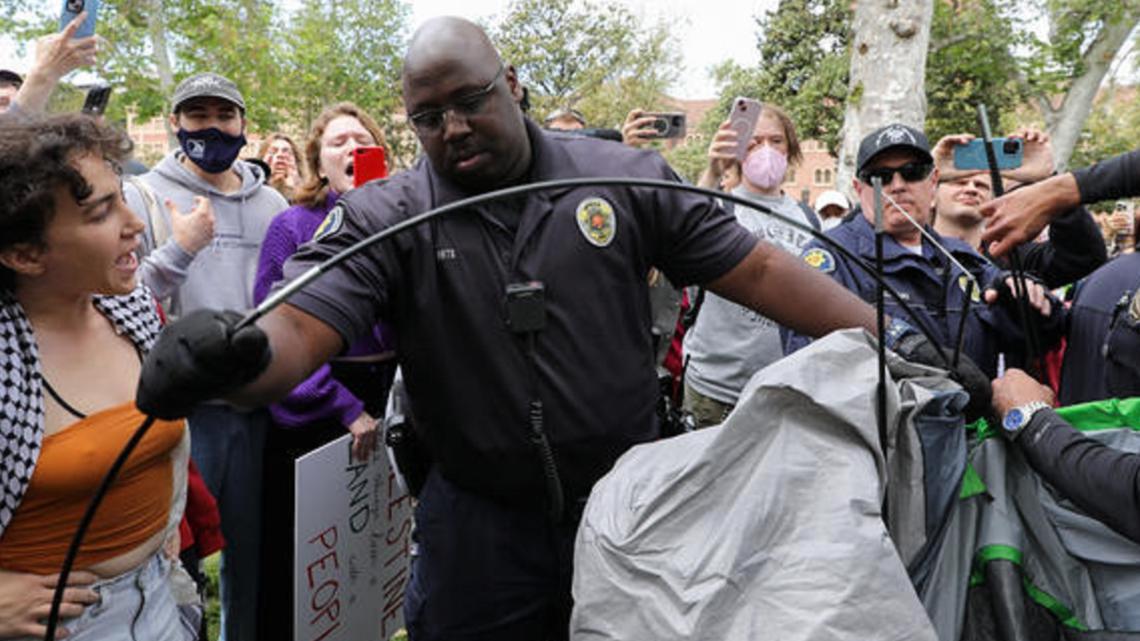
In Northern California, students at California State Polytechnic University, Humboldt, barricaded inside a building for a third day, and the school shut down campus through the weekend and made classes virtual.
UT Austin protests
At the University of Texas at Austin, hundreds of local and state police — including some on horseback and holding batons — moved against protesters Wednesday, at one point sending some tumbling into the street. Officers pushed their way into the crowd and made 34 arrests at the behest of the university and Texas Gov. Greg Abbott, according to the state Department of Public Safety.
A photographer covering the demonstration for Fox 7 Austin was in the push-and-pull when an officer yanked him backward to the ground, video shows. The station confirmed that the photographer was arrested. A longtime Texas journalist was knocked down in the mayhem and could be seen bleeding before police helped him to emergency medical staff.
Dane Urquhart, a third-year Texas student, called the police presence and arrests an "overreaction," adding that the protest "would have stayed peaceful" if the officers had not turned out in force.

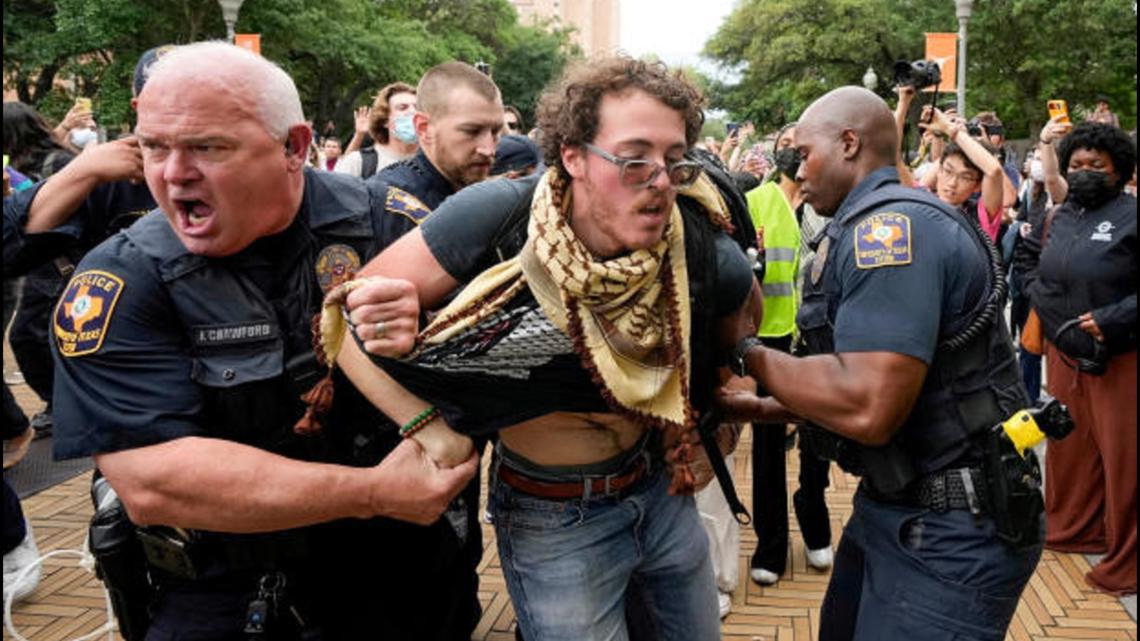
"Because of all the arrests, I think a lot more (demonstrations) are going to happen," Urquhart said.
Police left after hours of efforts to control the crowd, and about 300 demonstrators moved back in to sit on the grass and chant under the school's iconic clock tower.
In a statement Wednesday night, the university's president, Jay Hartzell, said: "Our rules matter, and they will be enforced. Our University will not be occupied."

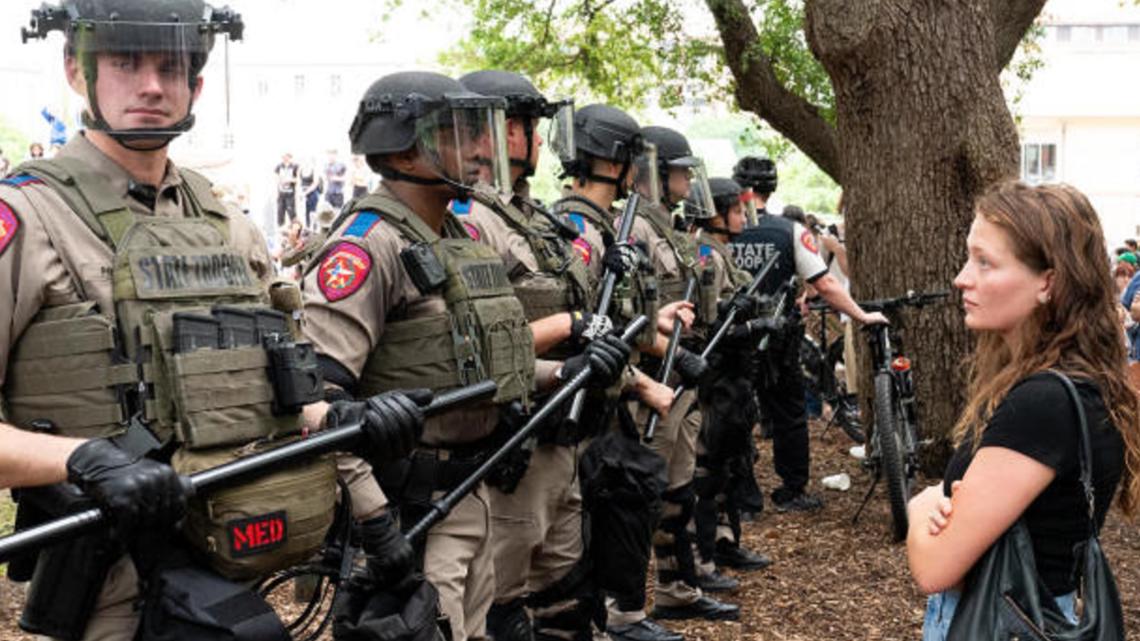
Columbia University protests
While grappling with growing protests from coast to coast, schools have the added pressure of May commencement ceremonies coming up. At Columbia University in New York, students defiantly erected an encampment where many are set to graduate in front of families in just a few weeks.
Columbia continued to negotiate with students after several failed attempts to clear the encampment and over 100 arrests in recent days.
The university averted another confrontation between students and police Wednesday. University President Minouche Shafik had set on Tuesday a midnight deadline to reach an agreement on clearing an encampment, but the school extended negotiations for another 48 hours.

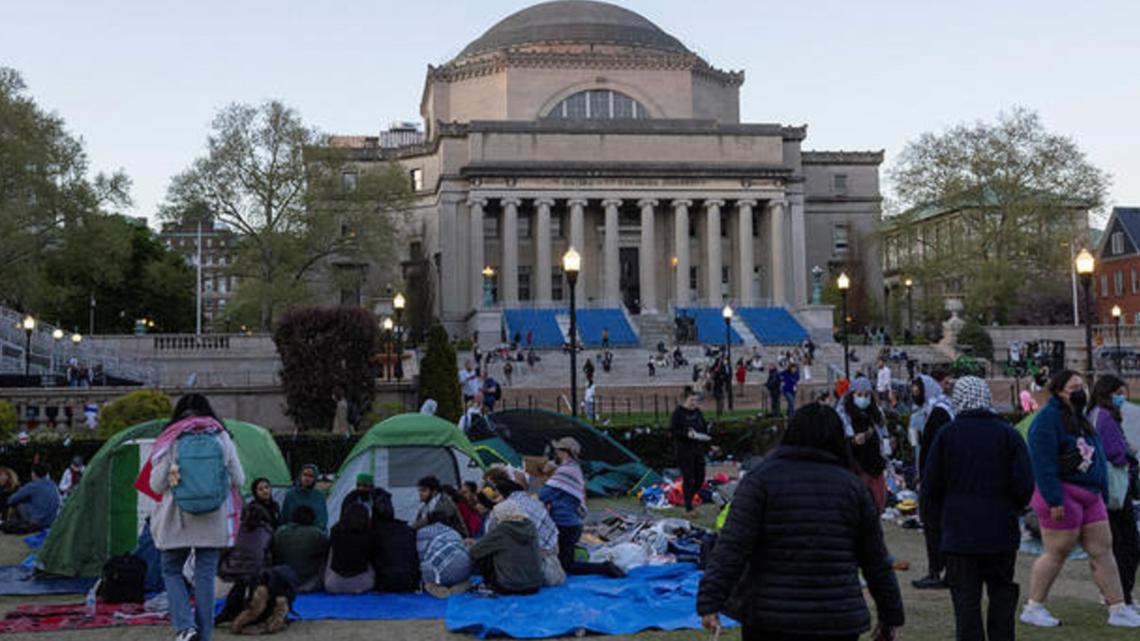
On a visit to campus Wednesday, U.S. House Speaker Mike Johnson, a Republican, called on Shafik to resign "if she cannot immediately bring order to this chaos."
He claimed the university is being taken over by a radical and extreme ideology, citing several recent incidents of antisemitic language by protesters on and off campus.
"We need the National Guard, law enforcement or someone to come in here and take control," Johnson told CBS News correspondent Nancy Chen. "Desperate times call for desperate measures."
New York Gov. Kathy Hochul accused Johnson of politicizing the protest by coming to campus and said she has no plans to call in the National Guard for now.
On Wednesday evening, a Columbia spokesperson said rumors that the university had threatened to bring in the National Guard were unfounded. "Our focus is to restore order, and if we can get there through dialogue, we will," said Ben Chang, Columbia's vice president for communications.
Columbia graduate student Omer Lubaton Granot, who put up pictures of Israeli hostages near the encampment, said he wanted to remind people that there were more than 100 hostages still being held by Hamas.
"I see all the people behind me advocating for human rights," he said. "I don't think they have one word to say about the fact that people their age, that were kidnapped from their homes or from a music festival in Israel, are held by a terror organization."
On Wednesday about 60 tents remained at the Columbia encampment, which appeared calm. Security remained tight around campus, with identification required and police setting up metal barricades.
Columbia said it had reached an agreement with protest representatives that only students would remain at the encampment, and that the protesters "have taken steps to make the encampment welcome to all and have prohibited discriminatory or harassing language."
Elsewhere in Manhattan, at New York University this week, police said 133 protesters were taken into custody. And on Monday, more than 40 protesters were arrested at an encampment at Yale University in Hew Haven, Connecticut, and charged with criminal trespass, a misdemeanor.

